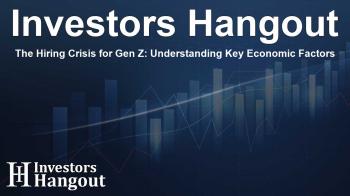The Hiring Crisis for Gen Z: Understanding Key Economic Factors

The Hiring Crisis for Gen Z
In today's economy, young Americans, particularly those under 25, are experiencing a significant challenge in securing employment. This issue, marked by increasing unemployment rates among recent graduates, is creating alarm. Most agree that the factors influencing this crisis point to a stagnation in hiring practices rather than advancements in artificial intelligence.
Insights from Jerome Powell
Federal Reserve Chair Jerome Powell has raised concerns about the current labor market, highlighting the difficulties young college graduates and minority groups face in finding employment. He points out that the underlying issues stem from a labor market characterized by low hiring and firing rates, creating a unique challenge for newcomers to the workforce.
Low Hiring and Firing Rates
Powell's analysis suggests that the job market is stuck in a rut, where companies are hesitant to hire due to economic uncertainties. This “low firing, low hiring” environment means that entry-level positions are particularly hard to come by, affecting fresh graduates who are eager to start their careers.
The Role of Economic Slowdown
While it's easy to blame artificial intelligence for the unavailability of jobs, Powell argues that the actual cause lies in a slower economy. Leading economists from reputable institutions share this view, indicating that broader economic conditions have created a hiring freeze that disproportionately affects younger workers.
Global Perspectives
Interestingly, this trend does not reflect a global crisis. Comments from UBS chief economist Paul Donovan reveal that the rise in youth unemployment in the U.S. contradicts trends observed in other countries. This suggests that the American labor market operates under unique conditions that merit closer examination.
The Changing Landscape of Employment
Goldman Sachs economist Pierfrancesco Mei suggests that the dynamics of job reallocations are changing. With fewer positions available and a decline in job churn, many young workers find themselves competing for limited opportunities. The churn rate, which indicates the number of workers changing jobs, has significantly dropped since the late 1990s.
Impact on Educational Attainment
Another point of contention is the education level of job seekers. Recent data suggests that less-educated individuals, such as high school dropouts, are finding it easier to secure stable work compared to their college-educated counterparts. This shift highlights an emerging trend toward vocational and trade employment, which is becoming increasingly attractive to younger generations.
Consequences for Gen Z and Minority Job Seekers
The implications for Gen Z and minority populations are severe. Experts warn that prolonged unemployment may have lasting effects on future earnings, homeownership aspirations, and wealth accumulation. Young job seekers need proactive support to navigate these challenging times.
Stricter Immigration Policies
Additionally, Powell notes that new immigration policies are constraining the labor supply further. These measures are exacerbating the challenges faced by lingering unemployment among young individuals. As companies tighten their hiring practices, the pathways to entering the job market become even more restricted.
Looking Ahead: Hope in Continuing Challenges
Despite these challenging dynamics, there is hope. By acknowledging the unique environment within the U.S. labor market and focusing on encouraging hiring, there can be a collective effort to address the ongoing crisis. Through targeted training and support for young workers, the economic landscape can improve, allowing new graduates to thrive.
Frequently Asked Questions
What is impacting Gen Z's ability to find jobs?
The challenges arise from a combination of economic stagnation, low hiring rates, and unique labor market conditions, rather than AI.
How does educational attainment affect job prospects?
Surprisingly, less-educated individuals are finding jobs more easily compared to recent college graduates, indicating a shift toward trade jobs.
What role do immigration policies play in this crisis?
Stricter immigration measures are limiting the labor supply, compounding difficulties for young job seekers in the market.
Are the issues faced by Gen Z unique to the U.S.?
Yes, the surge in youth unemployment in the U.S. stands in contrast to global trends, indicating unique local factors at play.
What can be done to support young job seekers?
Proactive support through targeted training programs can help young graduates navigate these challenges effectively.
About The Author
Contact Olivia Taylor privately here. Or send an email with ATTN: Olivia Taylor as the subject to contact@investorshangout.com.
About Investors Hangout
Investors Hangout is a leading online stock forum for financial discussion and learning, offering a wide range of free tools and resources. It draws in traders of all levels, who exchange market knowledge, investigate trading tactics, and keep an eye on industry developments in real time. Featuring financial articles, stock message boards, quotes, charts, company profiles, and live news updates. Through cooperative learning and a wealth of informational resources, it helps users from novices creating their first portfolios to experts honing their techniques. Join Investors Hangout today: https://investorshangout.com/
The content of this article is based on factual, publicly available information and does not represent legal, financial, or investment advice. Investors Hangout does not offer financial advice, and the author is not a licensed financial advisor. Consult a qualified advisor before making any financial or investment decisions based on this article. This article should not be considered advice to purchase, sell, or hold any securities or other investments. If any of the material provided here is inaccurate, please contact us for corrections.

